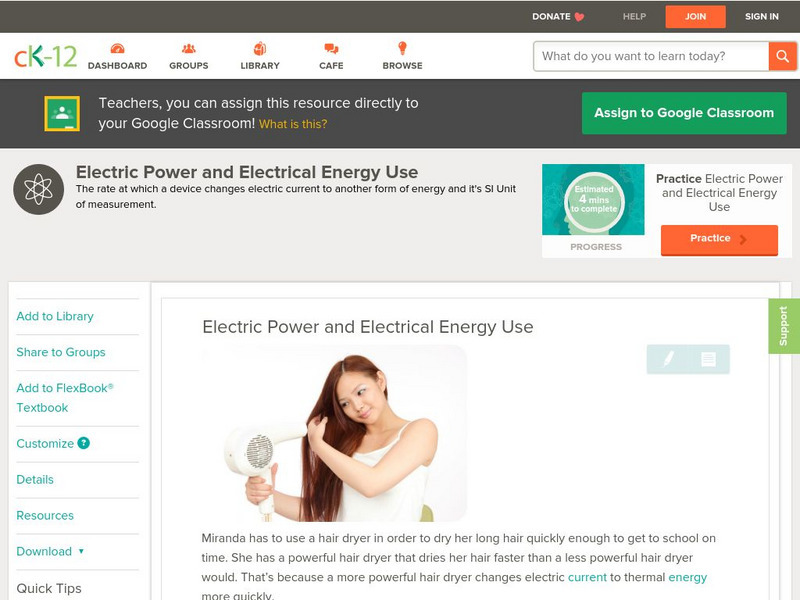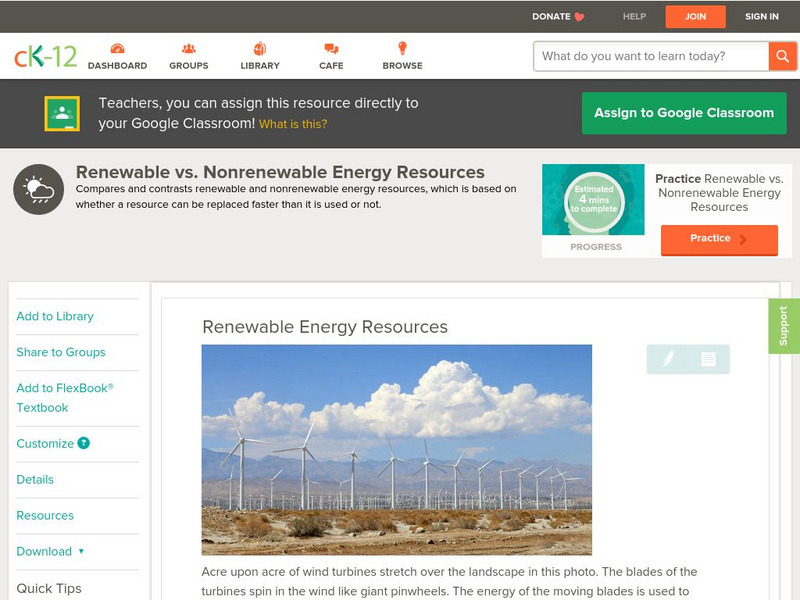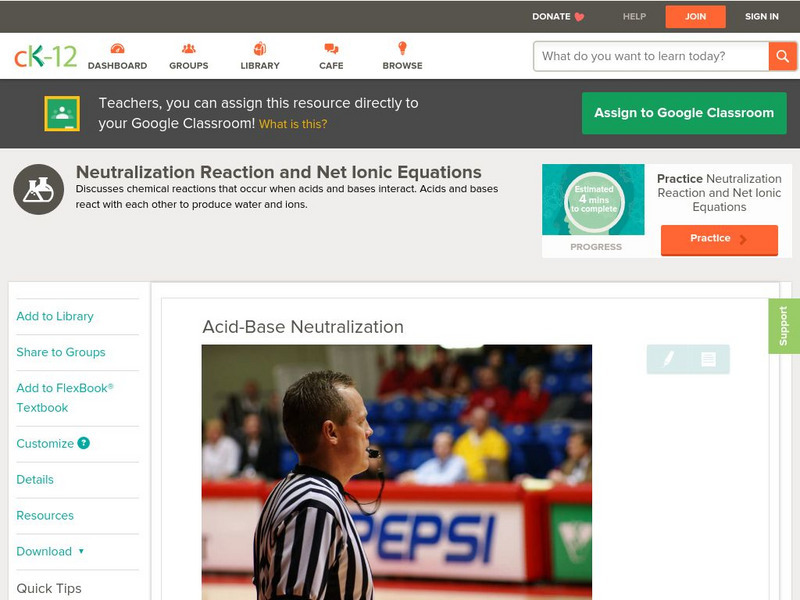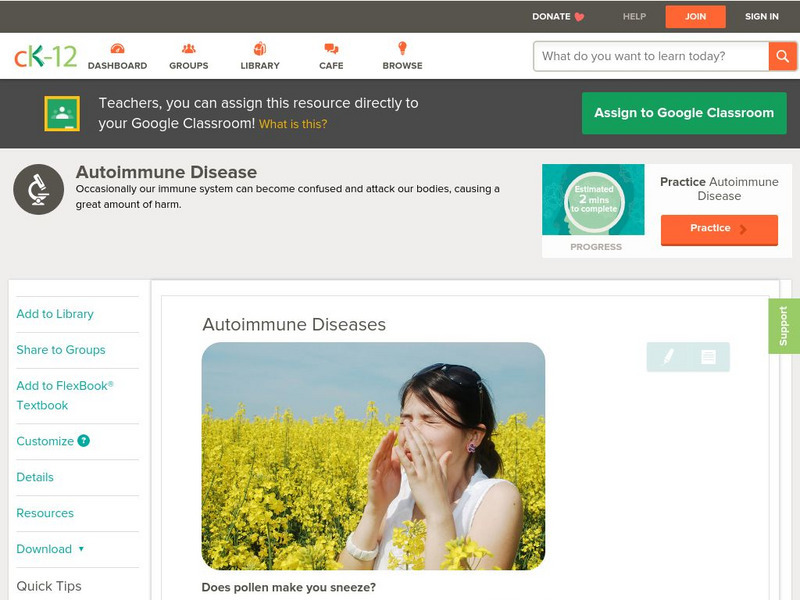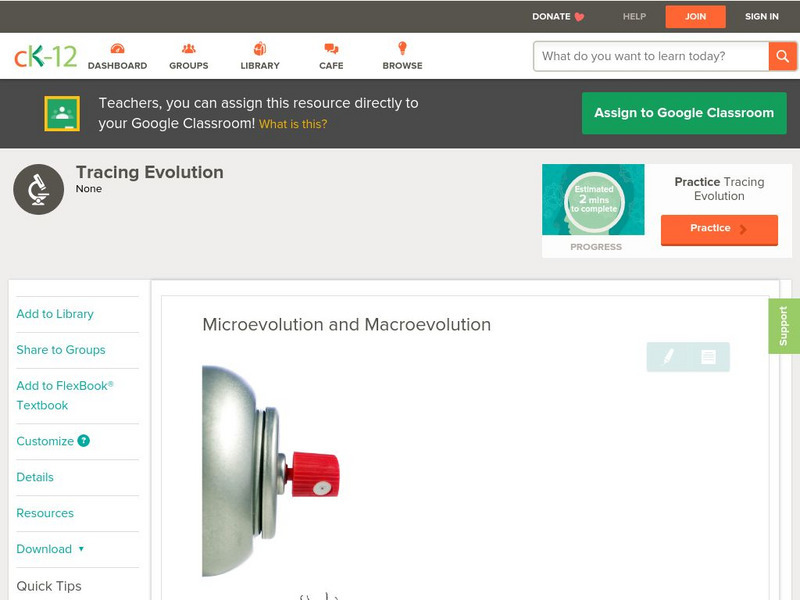Hi, what do you want to do?
CK-12 Foundation
Ck 12: Physical Science: Electromagnetic Spectrum
[Free Registration/Login may be required to access all resource tools.] Covers electromagnetic radiation and its properties, and the electromagnetic spectrum.
CK-12 Foundation
Ck 12: Earth Science: Nuclear Power
[Free Registration/Login may be required to access all resource tools.] How energy can be generated through nuclear reactions.
CK-12 Foundation
Ck 12: Physical Science: Fundamental Particles
[Free Registration/Login may be required to access all resource tools.] Investigates fundamental particles and their discovery, and how they relate to fundamental forces.
CK-12 Foundation
Ck 12: Physical Science: Saturation
[Free Registration/Login may be required to access all resource tools.] Saturation and the difference between saturated and unsaturated solutions.
CK-12 Foundation
Ck 12: Physical Science: Isomers
[Free Registration/Login may be required to access all resource tools.] Isomers and their properties, how the number of carbon atoms determines how many isomers a hydrocarbon has.
CK-12 Foundation
Ck 12: Physical Science: Electric Power and Electrical Energy Use
[Free Registration/Login may be required to access all resource tools.] Electric power and electric energy use of appliances and how to calculate them.
CK-12 Foundation
Ck 12: Physical Science: Ionic Compounds
[Free Registration/Login may be required to access all resource tools.] Ionic compounds: how they form, how the are named, and their properties and uses.
CK-12 Foundation
Ck 12: Earth Science: Renewable Energy Resources
[Free Registration/Login may be required to access all resource tools.] What renewable energy resources are and examples of renewable energy resources.
CK-12 Foundation
Ck 12: Earth Science: Renewable vs Non Renewable Energy Resources
[Free Registration/Login may be required to access all resource tools.] Compare and contrasts renewable and non-renewable resources.
CK-12 Foundation
Ck 12: Physical Science: Acid Base Neutralization
[Free Registration/Login may be required to access all resource tools.] The reaction of acids and bases and what ions are produced and the salts that form.
CK-12 Foundation
Ck 12: Life Science: Amphibians
[Free Registration/Login may be required to access all resource tools.] Amphibians are a group of vertebrates that have adapted to live in both water and on land. Amphibian larvae are born and live in water, and they breathe using gills....
CK-12 Foundation
Ck 12: Life Science: Animal Behaviors
[Free Registration/Login may be required to access all resource tools.] Barking, purring, and playing are just some of the ways in which dogs and cats behave. These are examples of animal behaviors. Animal behavior is any way that...
CK-12 Foundation
Ck 12: Life Science: Archaea
[Free Registration/Login may be required to access all resource tools.] For many years, archaea were classified as bacteria. Like the bacteria, archaea lacked a nucleus and membrane-bound organelles and, therefore, were prokaryotic...
CK-12 Foundation
Ck 12: Life Science: Autoimmune Diseases
[Free Registration/Login may be required to access all resource tools.] The immune system usually protects you from pathogens and other causes of disease. When the immune system is working properly, it keeps you from getting sick. But...
CK-12 Foundation
Ck 12: Life Science: Bacteria in the Digestive System
[Free Registration/Login may be required to access all resource tools.] Yogurt is a good source of calcium. Yogurt also contains active cultures of "good" bacteria. Foods that contain these beneficial bacteria are sometimes called...
CK-12 Foundation
Ck 12: Life Science: Bacteria Reproduction
[Free Registration/Login may be required to access all resource tools.] Bacteria, being single-celled prokaryotic organisms, do not have a male or female version. Bacteria reproduce asexually. In asexual reproduction, the "parent"...
CK-12 Foundation
Ck 12: Life Science: B and T Cell Response
[Free Registration/Login may be required to access all resource tools.] Some defenses, like your skin and mucous membranes, are not designed to ward off a specific pathogen. They are just general defenders against disease. Your body also...
CK-12 Foundation
Ck 12: Life Science: Biotechnology in Agriculture
[Free Registration/Login may be required to access all resource tools.] The majority of the corn in the United States is genetically engineered. Corn syrup is used to sweeten many things, like Coke. Corn is also fed to the cows. Learn...
CK-12 Foundation
Ck 12: Life Science: Bird Reproduction
[Free Registration/Login may be required to access all resource tools.] How do birds reproduce? We know that chickens lay eggs. But how do they do that? Learn more about bird reproduction in this learning module produced by CK-12.
CK-12 Foundation
Ck 12: Life Science: Cancer
[Free Registration/Login may be required to access all resource tools.] Cancer is a disease that causes cells to divide out of control. Normally, the body has systems that prevent cells from dividing out of control. But in the case of...
CK-12 Foundation
Ck 12: Life Science: Cartilaginous Fish
[Free Registration/Login may be required to access all resource tools.] Cartilaginous fish range in size from the dwarf lanternshark, at 6.3 inches, to the 50-foot whale shark. These fish have a jaw and evolved from the jawless fish....
CK-12 Foundation
Ck 12: Life Science: Light Reactions of Photosynthesis
[Free Registration/Login may be required to access all resource tools.] Although we generally discuss plants when learning about photosynthesis, keep in mind that plants are not the only organisms that can make their own food. Some...
CK-12 Foundation
Ck 12: Life Science: Meiosis
[Free Registration/Login may be required to access all resource tools.] Sexual reproduction combines gametes from two parents. Gametes are produced by a special type of cell division known as meiosis. Meiosis contains two rounds of cell...
CK-12 Foundation
Ck 12: Life Science: Microevolution and Macroevolution
[Free Registration/Login may be required to access all resource tools.] Does evolution only happen gradually through small changes? Or is it possible that drastic environmental changes can cause new species to evolve? Or can both small...
Other popular searches
- Ms Access 2003
- Ms Access 2007
- Ms Access Databases
- Using Ms Access
- Activities Using Ms Access
- Ms Access Lessons Plan
- Activities Ms Access
- Ms Access 2010
- Ms Access 2007 Weather
- Ms Access 2010 Lesson










